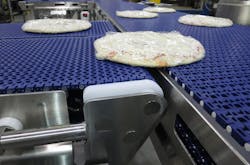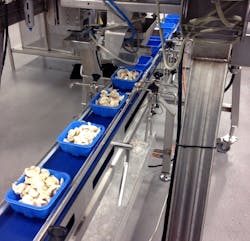Today, food and beverage manufacturers are producing more products and SKUs than ever before — and they’re often doing it on existing infrastructure. This means their equipment, including the conveyor systems, need to be versatile enough to handle different product lines and designed for fast cleaning to minimize downtime.
To accomplish higher production rates, companies need to gain a full understanding of how their sanitary conveyor systems interact with their other machinery and equipment. As equipment becomes more complex, the key is to understand the relationship between each component to best maximize the overall throughput and improve Overall Equipment Effectiveness (OEE).
A new perspective
There’s a perception still lingering that the rate of production is determined by individual machines. You want to produce 120 products per minute? Just crank up the speed and let it fly… right?
Not exactly.
When looking at the overall food and beverage manufacturing process, the throughput of the system isn’t decided by the individual machines. Rather, it’s decided by how well you can get your product in the right orientation, with the proper spacing, at the precise time to properly hand it off to the next machine in the line. By doing this, the entire processing/packaging line will run efficiently and at peak performance. The trick, of course, is getting your products orientated and where they need to be, when they need to be there.
To accomplish this, companies are not just looking at their conveyors to see where they can make improvements, but rather analyzing their entire processing/packaging lines from start to finish to increase efficiency and OEE.
OEE is a standard for measuring productivity. Essentially, it identifies the percentage of manufacturing time that is actually productive. When used properly, OEE is a powerful tool that helps companies define, visualize and ultimately eliminate equipment losses and waste. Because each process on the line affects the next, and the next, it’s advisable to audit all equipment along the line to determine if there is a weak spot that is affecting output and lowering a company’s OEE.
What this new high-level view of manufacturing accomplishes is highlighting the importance of integrating the right conveyor system in a processing/packaging line. Sanitary conveyors are no longer an afterthought, and they are playing a larger role in producing faster production rates with fewer errors. The key is to select the right sanitary conveyor for the application.
The right conveyor manufacturer
Many manufactures are happy to sell you a conveyor and be done. But that’s not the type of supplier you want to do business with, because they’re not providing you with any practical long-term value. Anyone can sell you a conveyor, but not everyone has the wherewithal to analyze your entire processing/packaging line and look for ways to improve line efficiencies.
The right conveyor supplier is looking at a total line solution. They want to know what’s occurring upstream and downstream of the conveyor to determine how their sanitary platform can best complement the entire line. Often, this research leads a manufacturer to recommend additional options to best orientate and move product along to the next station — all to make the line more efficient.
To help get the most out of your conveyor system, a competent supplier analyzes all aspects of your application and asks the right questions up front to ensure the platform they are designing will complement other equipment on the line to meet your production goals and increase your OEE.
Consistent sanitary design
A strong sanitary conveyor platform is one that has a hygienic design that not only minimizes product debris but also allows for fast and effective sanitation.
The continued rollout of the FDA’s Food Safety Modernization Act has forced many food manufacturers to take a closer look at their conveyors to ensure compliance and hygienic practices stay top of mind. But the law isn’t only affecting food companies, as some conveyor manufactures have also revamped their designs to provide consistent, true sanitary standards across their platforms. Engineering developments in conveyors like removing small nooks, crevices and fasteners that can become catch points for water, food particles and other particulates may seem small, but can, in fact, go a long way toward reducing breeding environments for bacteria to grow. Other features, like rounding squared edges to allow water and particulates to run off also contribute to a conveyor’s hygienic design.
It’s important to note a misconception that all stainless steel conveyors are sanitary — that’s simply not true in some cases. Stainless steel is certainly the right material to use in applications that call for regular washings with light chemical cleaning agents. A basic stainless steel conveyor can be washed throughout the day as needed, depending on how it is built, but it’s not necessarily sanitary. Sanitizing or cleaning a conveyor involves an entirely different process than simply washing it down, and much of achieving a sanitized conveyor depends on the way it was initially designed. Eliminating catch points to prevent water and particulate from collecting in the food zone is just one engineering example that goes into making a conveyor a true sanitary platform.
Conclusion
Food and beverage manufacturers can benefit by working with a reputable conveyor suppler who brings both application expertise and a true sanitary platform to the table. A partner supplier, who has the manpower, competency and expertise to design and coordinate integration of the conveyor with other equipment and most importantly make sure the production time achieves maximum throughput and OEE. Selecting a supplier with a proven track record to look at your entire processing line and leaning on that knowledge to offer sound recommendations for improvement provides value to you in the years to come.
John Kuhnz is vice president – Engineered Solutions at Dorner, a privately held, global manufacturer in the design, application and integration of low-profile conveyor platforms. He can be reached at 262-369-1332 or at [email protected].

